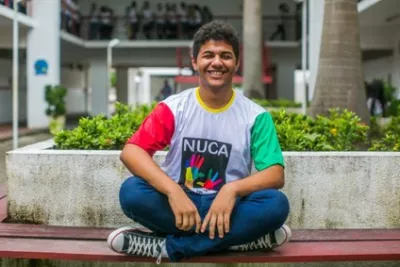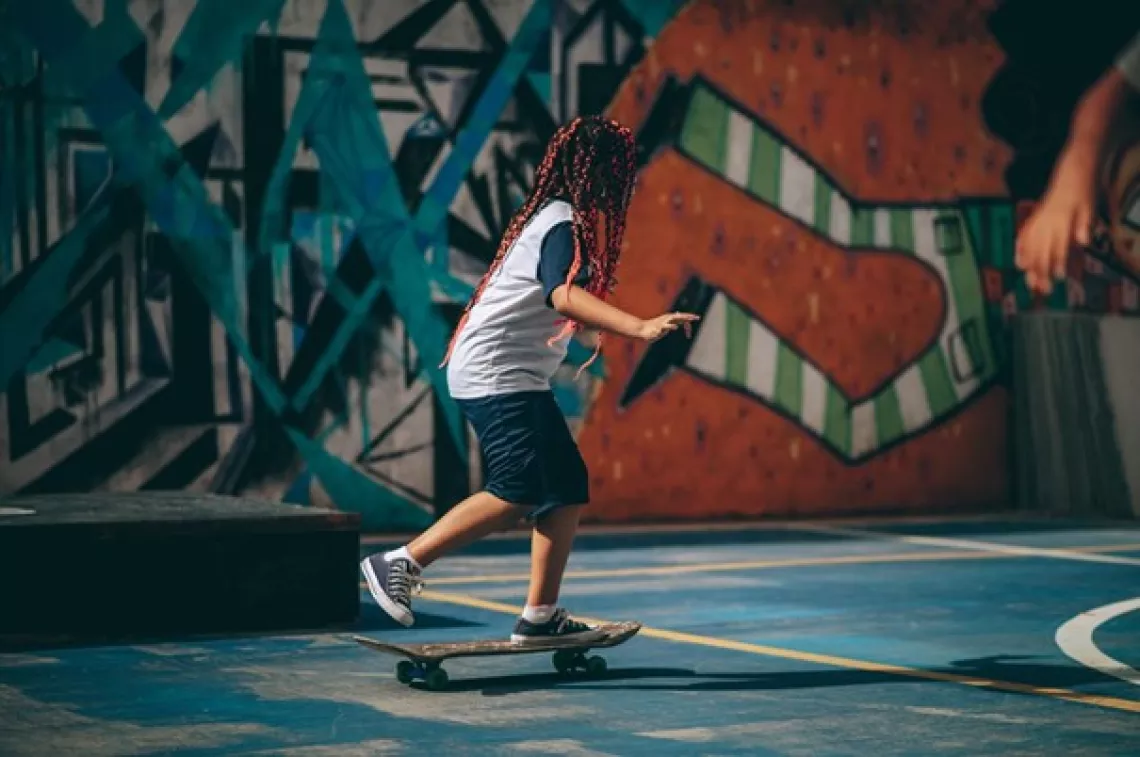Brazil
#AgendaCidadeUNICEF & SEAL (Selo UNICEF)
#AgendaCidadeUNICEF
#AgendaCidadeUNICEF is the initiative of UNICEF in Brazil to promote children’s rights while preventing and reducing violence against children and adolescents in urban centers. To achieve the established goals, #AgendaCidadeUNICEF will enhance public policies and work along with the municipalities.
In the first edition 2022-2024, the initiative is being implemented in 8 territories from 8 Brazilian state capitals:
Distrito d’Água, in Belém (Pará), Jangurussu, in Fortaleza (Ceará), Colonia Antonio Alexio in Manaus (Amazonas), Iburá, in Recife (Recife), Pavuna in Rio de Janeiro (Rio de Janeiro), Valeria in Salvador (Bahia), Cidade Operaria in São Luis (Maranhão) e Cidade Tiradentes in São Paulo (São Paulo), entailing the Amazon, Semiarid and Southeast regions of Brazil.
To be part of a people’s movement: #AgendaCidadeUNICEF is a movement of the cities, people, communities, private sector to strengthen the culture of inclusion, non-discrimination, and non-violence for Brazilian children and adolescents.
#AgendaCidadeUNICEF aims to tackle the specific needs and challenges in the most vulnerable territories, looking for solutions and fostering the potential from the very children, adolescents, families, public servants together with community leaders, artists, businessmen, and social media leaders, and aligned with municipalities’ action plans.
To be part of a city’s movement: Heading to the 2030 Agenda and to achieve the Sustainable Development Goals (SDGs), #AgendaCidadeUNICEF is mainly a movement of the cities and for the cities of Brazil for children and adolescents. The 8 capitals cities are the key-elements for a community of solutions to share lessons-learned and practical interventions to implement children’s rights in Brazil, and at the same time they are members of the world commitment to build cities protecting children and adolescents while promoting specific opportunities for them.
In these cities, #AgendaCidadeUNICEF focus its strategies on vulnerable territories where 8.2 million children and adolescents live. For every capital, the priority territory to be benefited by the initiative was defined by UNICEF together with each municipality, as a strategy to maintain the ownership of public managers and servants as part of the initiative, engaging the community as well. The priority territories to be impacted by the activities of #AgendaCidadeUNICEF will be the ones with the lowest social indicators and where high rates of violence against children and adolescents take place.
The prevention and reduction of violence is the focus of the initiative due to the high homicides rates and sexual violence among children and adolescents in Brazil, for instance. Between 2017 and 2020, 180,000 children and adolescents suffered from sexual violence, and 31,000 were murdered in the last five years1. Urban centers are the focus of #AgendaCidadeUNICEF because they center most human rights violations in the country.
One of the key-strategies of #AgendaCidadeUNICEF is to bring the municipal governments and the public services to the priority territories, in a strategy to recognize it with official presence while getting the community involved and actively participating.
The above-mentioned overall goal of #AgendaCidadeUNICEF is the prevention and reduction of violence against children through an integrated intervention composed by 1) “Education that Protects” (identification of dropouts children and promotion of non-violence behavior in and out of the school); 2) Strengthening of the Child protection services (increasing of the official reporting mechanism on violence against children while stablishing specialized services for victims); 3) 1 Million Opportunities (1MiO) initiatives focused on the territory to identify and promote learning and job opportunities for adolescents and young people, alongside their participation; and 4) Prevention of Violence from Early Childhood and offering mental health actions to children and adolescents, while strengthening the capacities of the professionals and, very importantly raising awareness among the community of the selected territories. UNICEF offers the experience in this implemented these lines of action while they are integrated in Municipal Official Plan of actions.
UNICEF SEAL (Selo UNICEF)
The UNICEF Seal is an initiative to promote the rights of children and adolescents in Brazil – reaching in the 2021-2024 edition 2,023 municipalities in the Amazon and Semiarid regions, where over 15 million boys and girls live.
Implemented since 1999, UNICEF Seal has been supporting the guarantee of rights, advocating for equality, and providing to the municipalities the needful tools and knowledge to enhance public policies. As a four-year strategy, UNICEF Seal is implemented in the full term of mayors, thus allowing that the actions implemented in its course be sustainable in the long term.
The UNICEF Seal focuses on the Amazon and Semiarid because these are the most unequal regions and where most human rights violations against children and adolescents take place. Working on the most vulnerable places in Brazil, the initiative acts towards the reduction of disparities to eliminate deprivations and promote basic rights and contributes to strengthening municipal public policies for children and adolescents, improving social indicators of vulnerable municipalities in a scalable and qualitative way, and producing positive results impacting children and adolescents who live there.
The UNICEF Seal is based on four pillars: 1) human rights; 2) rights of children and adolescents assured as a priority; 3) equity promotion as a strategy to leave no one behind; 4) management for results; and three principles: 1) equity; 2) integrated policies and availability of services; 4) development of leadership and children and adolescents’ full potential.
By joining UNICEF Seal, the municipalities commit themselves to follow and apply the actions established by the methodology of the initiative and to fulfill the Convention of Rights of the Child, which is Brazil is reflected in the Statute of the Child and Adolescent (ECA). In addition, Selo also supports the SDGs with 10 of the 17 SGDs being reflected in its activities.
The proposed methodology for the 2021-2024 edition of the Selo responds to the main challenges faced by the municipalities, especially the ones caused by Covid-19. If in the latest years Brazil was improving in some agendas and indicators, the pandemic has put a halt on the development and caused severe social setback. Therefore, in a context of fragility and disrupted services, Selo provides the necessary support so public policies may be reimplemented and the rights of children and adolescents guaranteed.
For four years, the municipalities will have to work on three axes: 7 Systemic Results; 4 Civic Participation and Results-based Management; and 7 Social Impact Indicators. The municipalities that fulfill with the mandatory activities of the Systemic Results and Results-based Management axes and achieve the established Social Impact Indicators in 2024 will be certified as municipalities that guarantee and promote the rights of children and adolescents and will be awarded with the UNICEF Seal.
7 Systemic Results:
- Early Childhood Development
- Education for All
- Hygiene Habits
- Education Opportunities, Work and Professional Training for Adolescents and Youth
- Comprehensive Development, Mental Health and Well-being of Children and Adolescents in the second decade of life
- Prevention and Responses to Violence Against Children and Adolescents
- Social Protection and Attention to Vulnerable Families through Intersectoral Services
For each of the 7 Systemic Results, UNICEF Seal proposes 7 Social Impact Indicators that shall be achieved by the end of the initiative in 2024:
- Percentage of 1-year-old children immunized against measles, mumps, rubella (MMR) and varicella (MMRV)
- Percentage of public elementary school students who drop out of school
- Percentage of municipal elementary schools with access to water and sanitation
- Percentage of adolescents (15-17) who are enrolled in high school
- Percentage of newborn babies born from adolescents (aged 10-19 years)
- Percentage of cases of violence against children and adolescents reported
- Percentage of families in the Unified Registry for Social Programs monitored by the Integral Family Care Programme (PAIF)
In order to implement the 7 Systemic Result and achieve the established 7 Social Impact Indicators, UNICEF Seal encourages the participation of the society to monitor the progress of the municipality in the initiative. Therefore, a results-based management approach is proposed to strengthen civic presence and guarantee the fulfillment of UNICEF Seal’s goals through the mobilization of:
- Guardianship Council
- Municipal Council for Children and Adolescents (CMDCA)
- Adolescent Citizenship Nucleus (NUCA)
- Community Forum

COUNTRY FACTS
Population: 213,317,639
Pop. under 18: 53,273,898
Pop. under 18 in the 8 cities of #AgendaCidadeUNICEF: 7,248,649
CONTACTS
- #AgendaCidadeUNICEF
Rosana Vega, Agenda Cidade UNICEF Coordinator and Chief of Child Protection, rvega@unicef.org
- UNICEF SEAL (Selo UNICEF)
Brasilia: Mario Volpi, UNICEF Seal National Coordinator and Chief of the Adolescent and Youth Development Programme, mvolpi@unicef.org
Amazon Territory: Ida Oliveira, Communication Specialist, ipoliveira@unicef.org
Semiarid Territory: Bruno Viecili, Communication Specialist, bviecili@unicef.org
LINKS
RESOURCES
List of municipalities enrolled in Brazil
8 municipalities enrolled in #AgendaCidadeUNICEF
- Belem
- Fortaleza
- Manaus
- Recife
- Rio de Janeiro
- Salvador
- São Paulo
- São Luís
2,023 municipalities enrolled in SEAL UNICEF
AMAZON REGION: 676 municipalities enrolled
SEMI-ARID REGION: 1,347 municipalities enrolled
See the complete list on https://www.selounicef.org.br/participantes-2021-2024

